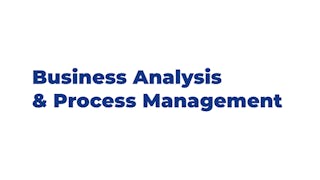- Browse
- Business Administration
Business Administration Courses
Business Administration courses can help you learn financial management, marketing strategies, organizational behavior, and operations management. You can build skills in effective leadership, strategic planning, and data analysis to drive business decisions. Many courses introduce tools like Microsoft Excel for financial modeling, CRM software for customer relationship management, and project management platforms to streamline operations.
Popular Business Administration Courses and Certifications
 Status: PreviewPreviewU
Status: PreviewPreviewUUniversity of Glasgow
Skills you'll gain: Business Administration, Leadership Studies, Supply Chain, Marketing Strategies, Digital Transformation, Supply Chain Management, Marketing, Financial Data, Innovation, Corporate Sustainability, Accounting, Business Modeling, Change Management, Business Economics, Project Management, Business Strategies, Global Marketing, B2B Sales
4.6·Rating, 4.6 out of 5 stars244 reviewsIntermediate · Course · 1 - 4 Weeks
 Status: Free TrialFree TrialU
Status: Free TrialFree TrialUUniversity of Pennsylvania
Skills you'll gain: Financial Statements, Operations Management, Operational Efficiency, Financial Statement Analysis, Return On Investment, Accrual Accounting, Human Capital, Process Analysis, Branding, Financial Accounting, Marketing, Process Management, People Management, Strategic Marketing, Capital Budgeting, Financial Reporting, Finance, Peer Review, Project Design, Corporate Finance
4.7·Rating, 4.7 out of 5 stars26K reviewsBeginner · Specialization · 3 - 6 Months

Skills you'll gain: Process Analysis, Business Process, Business Analysis, Workflow Management, Process Management, Process Flow Diagrams, Business Process Modeling, Stakeholder Management, Stakeholder Analysis, Computer Literacy
4.4·Rating, 4.4 out of 5 stars7.2K reviewsBeginner · Guided Project · Less Than 2 Hours
 Status: Free TrialFree TrialU
Status: Free TrialFree TrialUUniversity of California, Irvine
Skills you'll gain: Search Engine Marketing, Business Strategy, Keyword Research, Digital Marketing, Organizational Leadership, Online Advertising, Search Engine Optimization, Business Planning, Content Marketing, Accountability, Cash Flow Forecasting, Business Management, Leadership and Management, Management Training And Development, Social Media Strategy, Social Media, Team Leadership, Strategic Planning, Banking, Storytelling
4.7·Rating, 4.7 out of 5 stars750 reviewsBeginner · Specialization · 1 - 3 Months
 Status: Free TrialFree TrialI
Status: Free TrialFree TrialIIESE Business School
Skills you'll gain: Value Propositions, Financial Statements, Marketing, Financial Statement Analysis, Branding, Leadership Development, Business Analytics, Marketing Strategies, Income Statement, Business Analysis, Strategic Marketing, Intercultural Competence, Financial Analysis, Accounting, Conflict Management, Financial Management, Financial Acumen, Financial Data, Leadership, Finance
4.8·Rating, 4.8 out of 5 stars5.5K reviewsBeginner · Specialization · 3 - 6 Months
 Status: Free TrialFree TrialU
Status: Free TrialFree TrialUUniversity of Colorado Boulder
Skills you'll gain: Business Writing, Constructive Feedback, Teamwork, Conflict Management, Business Correspondence, Business Communication, Recognizing Others, Team Building, Collaboration, Diversity Awareness, Writing, Mediation, Organizational Skills, Concision, Writing and Editing, Team Motivation, Tactfulness, Performance Management, Staff Management, Grammar
4.8·Rating, 4.8 out of 5 stars11K reviewsBeginner · Specialization · 3 - 6 Months
What brings you to Coursera today?
 Status: Free TrialFree TrialU
Status: Free TrialFree TrialUUniversity of London
Skills you'll gain: Operations Management, Process Design, Operational Excellence, Business Operations, Operational Efficiency, Consumer Behaviour, Marketing Planning, Marketing Strategies, Marketing Strategy and Techniques, Strategic Marketing, Competitive Analysis, Business Ethics, Marketing Psychology, Marketing, Social Sciences, International Relations, Culture, Business Management, Business, Sustainable Business
4.5·Rating, 4.5 out of 5 stars477 reviewsBeginner · Specialization · 3 - 6 Months
 Status: Free TrialFree TrialU
Status: Free TrialFree TrialUUniversity of Virginia
Skills you'll gain: Financial Statements, Financial Accounting, Balance Sheet, Financial Reporting, Financial Statement Analysis, Design Thinking, Accounting, Annual Reports, Innovation, Process Design, Business Modeling, Entrepreneurship, Philanthropy, Leadership Development, Strategic Leadership, Corporate Sustainability, Professional Development, Business Ethics, Finance, HR Tech
4.8·Rating, 4.8 out of 5 stars7.7K reviewsBeginner · Specialization · 3 - 6 Months
 U
UUniversity of London
Skills you'll gain: Process Design, Global Marketing, Consumer Behaviour, Statistical Analysis, Organizational Change, Process Mapping, Statistical Methods, Integrated Marketing Communications, Advertising, Innovation, Mergers & Acquisitions, Training and Development, Virtual Teams, Databases, Cost Accounting, International Finance, Research, Team Management, Economic Development, Cultural Diversity
Earn a degree
Degree · 1 - 4 Years
 I
IIllinois Institute of Technology
Skills you'll gain: Process Improvement, Pay Per Click Advertising, Digital Marketing, Responsible AI, Process Management, Global Marketing, Web Analytics, Culture Transformation, Financial Statement Analysis, Descriptive Statistics, Digital Transformation, Market Dynamics, Capital Budgeting, Design Thinking, Predictive Analytics, Leadership and Management, Game Theory, Product Lifecycle Management, Microsoft Excel, Business Strategy
Earn a degree
Degree · 1 - 4 Years
 Status: Free TrialFree TrialI
Status: Free TrialFree TrialIIllinois Tech
Skills you'll gain: Process Improvement, Process Management, Global Marketing, Business Process, Business Process Management, Financial Statement Analysis, Financial Statements, Brand Management, Leadership and Management, Financial Analysis, Marketing, People Management, Team Leadership, Strategic Marketing, Organizational Change, Leadership, Inventory Accounting, Business Strategy, Financial Management, Data Analysis
Build toward a degree
4.7·Rating, 4.7 out of 5 stars339 reviewsIntermediate · Specialization · 3 - 6 Months
 Status: Free TrialFree Trial
Status: Free TrialFree TrialSkills you'll gain: Data Storytelling, Risk Mitigation, Business Analysis, Business Process Modeling, Risk Analysis, Data Presentation, Interactive Data Visualization, Project Scoping, Data Visualization, Process Flow Diagrams, Stakeholder Analysis, Process Optimization, Prompt Engineering, Stakeholder Management, Digital Transformation, Responsible AI, Excel Formulas, Microsoft Excel, Business Analytics, Business Requirements
4.7·Rating, 4.7 out of 5 stars14K reviewsBeginner · Professional Certificate · 3 - 6 Months
What brings you to Coursera today?
In summary, here are 10 of our most popular business administration courses
- MBA Essentials: University of Glasgow
- Business Foundations: University of Pennsylvania
- Business Analysis & Process Management: Coursera
- Introduction to Business: University of California, Irvine
- Foundations of Management: IESE Business School
- Business Communication: University of Colorado Boulder
- Business and Marketing Strategies: University of London
- Entrepreneurship: Growing Your Business: University of Virginia
- Bachelor of Science in Business Administration: University of London
- Master of Business Administration (MBA): Illinois Institute of Technology
Frequently Asked Questions about Business Administration
Business administration refers to the management and organization of business operations, encompassing various functions such as finance, marketing, human resources, and strategic planning. It is crucial because it ensures that organizations run efficiently and effectively, enabling them to achieve their goals and adapt to changing market conditions. A solid foundation in business administration equips individuals with the skills needed to make informed decisions, optimize resources, and drive growth.
A degree or training in business administration can open doors to a variety of career paths. Common job roles include business analyst, operations manager, marketing coordinator, human resources specialist, and project manager. Additionally, positions in finance, such as financial analyst or accountant, are also prevalent. The versatility of business administration allows professionals to work in diverse industries, from healthcare to technology, making it a valuable field of study.
To succeed in business administration, you should develop a range of skills. Key competencies include analytical thinking, effective communication, leadership, and problem-solving abilities. Familiarity with financial principles, marketing strategies, and human resource management is also essential. Additionally, proficiency in data analysis and technology tools can enhance your effectiveness in various roles within business administration.
There are numerous online courses available for those interested in business administration. Some notable options include specializations in healthcare administration, such as the The Business of Health Care Specialization, and professional certificates like the Google Professional Workspace Administrator Professional Certificate. These courses provide valuable insights and practical skills applicable to real-world business scenarios.
Yes. You can start learning business administration on Coursera for free in two ways:
- Preview the first module of many business administration courses at no cost. This includes video lessons, readings, graded assignments, and Coursera Coach (where available).
- Start a 7-day free trial for Specializations or Coursera Plus. This gives you full access to all course content across eligible programs within the timeframe of your trial.
If you want to keep learning, earn a certificate in business administration, or unlock full course access after the preview or trial, you can upgrade or apply for financial aid.
To learn business administration, start by identifying your areas of interest within the field. You can enroll in online courses, attend workshops, or participate in webinars. Engaging with professionals in the industry through networking events or online forums can also provide insights and mentorship. Practical experience through internships or entry-level positions can further solidify your understanding and application of business concepts.
Business administration courses typically cover a wide range of topics, including organizational behavior, financial management, marketing principles, strategic planning, and human resource management. Additionally, courses may explore project management, operations management, and entrepreneurship, providing a comprehensive understanding of how businesses operate and succeed.
For training and upskilling employees in business administration, courses that focus on specific skills or areas are particularly beneficial. Options like the Medical Office Procedures and Administration Fundamentals Specialization can help employees gain targeted knowledge. Additionally, courses that emphasize leadership and management skills can enhance overall team performance and organizational effectiveness.










